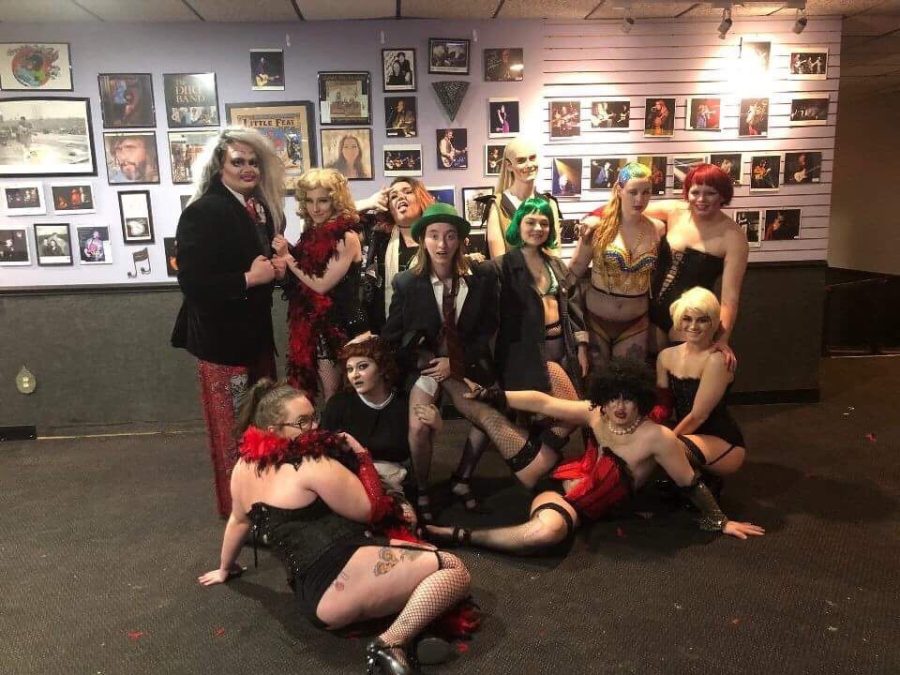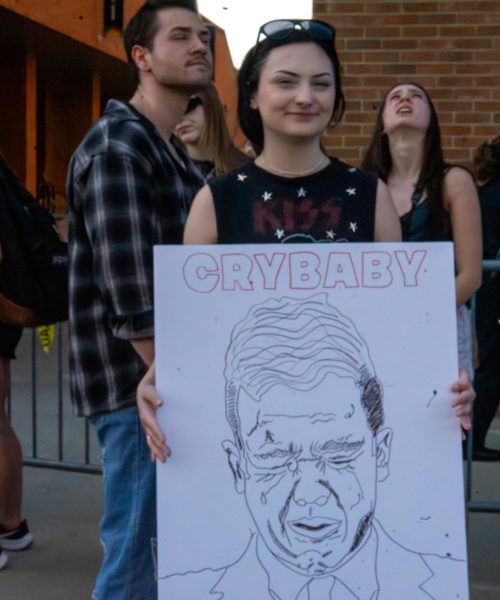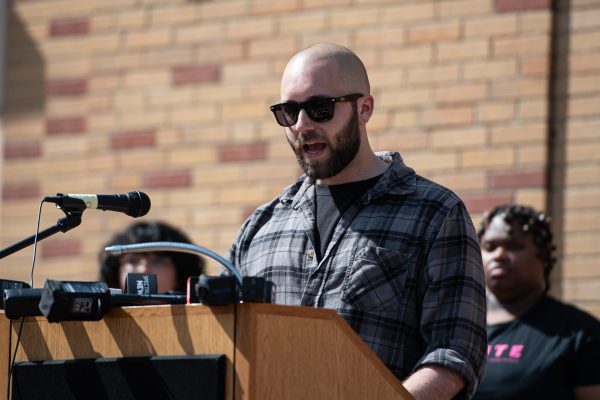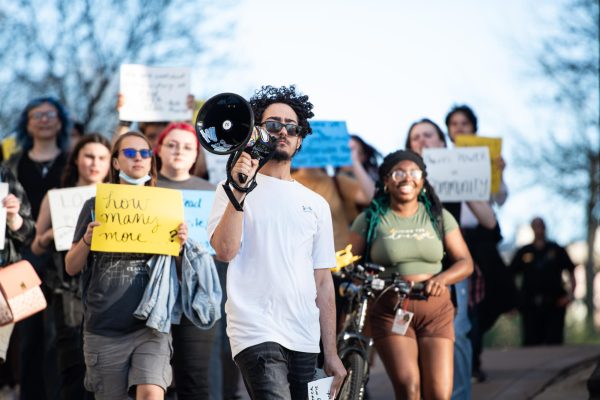Behind the Stage: Volunteer group breaks barriers to perform “Rocky Horror Picture Show”
March 21, 2018
The cult classic “Rocky Horror Picture Show” has been performed at the Kent Stage for years, yet little is known of its origins.
The School of Rocky is an independent troupe of volunteer actors that have been recreating the iconic musical downtown since January of 2016.
David Steinberger, a clinical mental health counseling graduate student, is the founder and director of the troupe. At first, he originally studied at Hiram College.
“It was a great college but ultimately secluded from society,” Steinberger said. “I needed an outlet for my creativity and performing passion.”
So he came to Kent and founded The School of Rocky.
“Kent needed Rocky,” Steinberger said. “It desperately needed an after hours hub for raunchy, sexy, LGBTQ-friendly fun!”
Despite the troupe’s humble beginnings, creating The School of Rocky was not always an easy task.
“There have been many challenges and roadblocks along the way,” Steinberger said. “The Kent Stage was hesitant to host us for multiple reasons. From what I was told, the administration at the Kent Stage and the previous shadow cast didn’t see eye to eye, which prevented them from working together. This left a bad taste in the administration’s mouth in regards to Rocky and made my relationship with them slow and tense at first.”
Along with having to redefine Rocky Horror, the troupe was also faced with the challenge of acquiring proper funding at the start of this endeavor.
“At first, all the props and most of the costumes were provided or handmade by myself and several other cast members,” Steinberger said. “If you look, pictures from some of the first shows we were literally just working with pantomimed props.”
Over time, The School of Rocky has overcome these challenges.
“We have a very communicative and friendly relationship with the Kent Stage and we are working on enhancing our show to an impressive and expansive level,” Steinberger said.
Although, one challenge the shadow cast has continued to face is safety. Steinberger has gone through safety training with the cast to ensure if there are any red flags during a show, they bring it to his attention. However, being vigilant enough to spot danger 100 percent of the time is impossible.
“Since we are an LGBTQ safe space and we are open to the general public, we are a targeted group and are at risk of being victimized,” Steinberger said. “I live in fear that (one day) an incident of hate or ignorance could harm a cast member or a member of the audience. But I take as many precautions as possible to prevent that from happening.”
Among everything else, Steinberger describes being challenged with inclusivity within the troupe. “About 90 to 95 percent of our cast is white and has been since the beginning,” Steinberger said.
“It is not the case that we are trying so hard to be canon to the musical that we only hire white actors and I don’t want to be perceived like that is what we are doing,” he added.
Steinberger hopes to include a more diverse cast in future shows. “My goal for the next couple of years is to include more people of color on cast,” he said.
“The Rocky Horror Picture Show” debuted in 1975. Shadow casts have been recreating the show for audiences for years, so naturally the live performances may attract older audiences.
Despite the age demographic, Steinberger believes being so close to a college campus really helps their audience thrive. “Being so close to a college campus provides a good audience. We really try to cater to a more youthful audience to (ensure) that people want to keep coming back,” Steinberger said.
The money made from tickets and “prop bags” goes towards bettering the costumes, the necessary elements for advertising the show and the production itself.
The shows usually have a good turnout with intense audience participation, creating a very sensual and energetic experience.
“We focus on what will get the audience involved,” Steinberger said. “The ‘virgin sacrifice’ is a big one.”
Individuals that have never been to a Rocky Horror show are known as “virgins” and are in for a wild initiation process at the beginning of the show. This is a common staple at all Rocky Horror performances.
Veronica Ruhe, a senior political science major, is the co-founder of the troupe. Ruhe typically shadows Janet (Susan Sarandon).
With Rocky Horror being such a well-known classic, cast members must really show dedication and energy to bring the performance to life.
“It can be daunting at first,” Ruhe said. “Especially because we change things and re-choreograph some scenes; we’re different.”
Steinberger describes the changes they make to the production to be scary at first, especially not knowing how older audiences will respond. “I was afraid people would be upset that we change so much,” Steinberger said. “But so far everyone has really loved it.”
Steinberger, who has nearly four years of “Rocky Horror experience” under his belt, prides himself on “constantly pushing everyone to be better.”
“It was intimidating at first because David had such high expectations,” Ruhe said. “And a lot of people in the cast didn’t have a lot of theatre experience because theatre majors are just too busy for this.”
“It’s cool that we don’t have a lot of theatre majors because we have so much diversity,” Steinberger said. “We’re a very tight-knit group.”
The cast is incredibly dedicated and experienced and are always working to ensure their show is the best it can be for the audience. Steinberger, who is skilled in sewing, has even worked to create some of the show-specific costumes, such as Columbia’s costume, necessary for the production.
“My hobbies have helped me a lot in this,” said Steinberger. “The more time I have, the more stuff I’ll make for the show.”
In hopes to create more inclusion and connect to Kent, the troupe is working on an initiative within the next few months to reserve a spot in the cast for a local aspiring drag king or queen.
“The purpose of that is to give a creative and supportive outlet for a drag performer to enhance their own knowledge of performing makeup and costumes and be able to take that with them through their performance career,” Steinberger said.
The troupe ultimately loves to have a good time and entertain. “I really like when the audience sees that we get along and love each other,” Ruhe said.
Steinberger agreed and stated that the best comment to receive from an audience member is, “it looks like you guys having fun.”
“It’s also great to hear other troupes tell us we’re doing good,” he said.
Maria McGinnis is an entertainment reviewer. Contact her at [email protected].
























